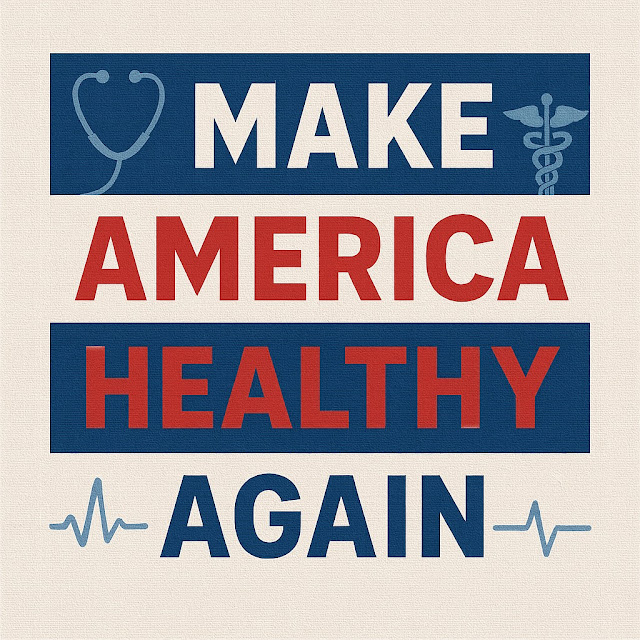Dr. Emrick's Books, Blogs, and Podcasts
In a move that blends political intrigue with public health ambition, Dr. Mehmet Oz, a cardiothoracic surgeon and former television personality, has stepped into the demanding role of Administrator for the Centers for Medicare & Medicaid Services (CMS). His appointment by President Trump, serving under an imagined HHS Secretary Robert F. Kennedy Jr., marks the beginning of a new chapter for the $1.7 trillion agency responsible for the health of over 160 million Americans. As Dr. Oz completes his first week, he's rolling out a vision framed by the resonant slogan: "Make America Healthy Again."
On the surface, the message is one of bold action and
compassionate stewardship. Dr. Oz speaks of protecting society's most
vulnerable – children, the disabled, and seniors – and modernizing the vast
programs under his purview, from Medicare and Medicaid to the Health Insurance
Marketplace. He echoes President Trump's and Secretary Kennedy's confidence,
pledging to bring "curiosity, courage, competence, and compassion" to
the task. The agenda hits familiar, laudable notes: empowering patients with
cost transparency, freeing doctors from paperwork to focus on outcomes,
tackling wasteful fraud, and crucially, shifting the nation's healthcare focus
from treating sickness to fostering wellness and prevention.
These are goals nearly everyone can get behind. Who wouldn't
want clearer medical bills, doctors less burdened by bureaucracy, taxpayer
money protected, and a healthier population overall? Dr. Oz’s supporters would
point to his unique background – the Harvard education, the MD-MBA combination
suggesting management acumen, the professorship at Columbia, and his undeniable
skill in communicating complex health topics to millions – as ideal
qualifications for such a monumental undertaking.
However, peeling back the layers reveals a picture that
invites considerable skepticism, particularly when viewed through a scholarly
and humanized lens. Perhaps the most jarring element is the political landscape
itself. The idea of Dr. Oz, a Trump-endorsed figure, working smoothly under RFK
Jr., known for his independent streak and specific health stances often outside
the mainstream of either major party, strains credulity. In the real world,
such disparate political and potentially ideological figures within the same
health leadership structure would likely lead to friction, not synergy. It
feels more like a hypothetical scenario than a workable administration. However,
I can certainly be wrong. This working relationship might be just what the
doctor calls for.
Beyond the political head-scratchers, the policy priorities
themselves, while sounding promising, bump up against long-standing, complex
realities. Take cost transparency. The desire for patients to understand
healthcare costs before receiving care is deeply felt by
families navigating opaque bills. Yet, achieving meaningful transparency in a
system rife with negotiated rates, bundled payments, and unpredictable
variables has proven incredibly difficult for successive administrations. It's
like wanting a guaranteed quote to fix a strange noise in your car before the
mechanic even pops the hood – the complexity often defies simple answers.
Similarly, equipping providers and focusing on outcomes is a
worthy goal, reflecting the real frustrations doctors and hospitals face with
administrative burdens. The move towards "value-based care" is
underway, but defining, measuring, and fairly rewarding "good health
outcomes" across diverse patient populations is a slow, intricate process.
It’s not a switch that can be flipped quickly. Fighting fraud, while essential,
is a perpetual cat-and-mouse game; fraudsters are adaptive, and while vigilance
is necessary, declaring victory is often premature.
The call to shift from "sick care" to prevention
and wellness is perhaps the most profound and aspirational goal. We all know
it's better to prevent illness than to treat it. Yet, our healthcare system is
fundamentally built and financed around treating sickness. Truly shifting this
paradigm involves changing deep-seated financial incentives and addressing
social determinants of health – like poverty, education, and access to healthy
food – factors often extending far beyond CMS's direct control. It’s akin to
trying to change the course of a massive container ship; the rudder turns, but
the vessel responds ponderously.
Finally, there's Dr. Oz himself. While his communication
skills are undeniable, his time as a TV host also drew criticism from parts of
the medical community for promoting treatments that sometimes lacked robust
scientific backing. Leading CMS demands rigorous adherence to evidence-based
policy and navigating dense regulations – a far cry from daytime television.
The question lingers: Would policy decisions be driven purely by data and
established science, or could they be influenced by the same populist appeal
that characterized his show? Being a relatable health communicator differs from
being the meticulous architect of national healthcare policy.
In essence, the announcement presents a compelling vision
led by a familiar face. However, the "Make America Healthy Again"
agenda, housed within an unlikely political structure and facing the deeply
entrenched complexities of the US healthcare system, appears more as a
statement of aspiration than a realistic, immediately actionable plan. The
goals are worthy, but the path to achieving them remains as challenging and
complicated as ever, requiring far more than a new slogan and a well-known
administrator.

Comments
Post a Comment